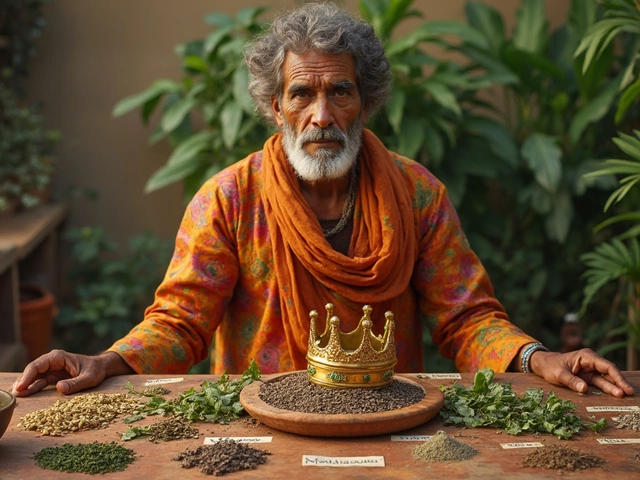- Home
- ::
- Homeopathy vs. Ayurveda: What's the Difference?

Homeopathy vs. Ayurveda: What's the Difference?
Ever found yourself puzzled over the difference between homeopathy and Ayurveda? You're not alone. Both are forms of natural medicine, but they come from different corners of the world and have their own unique vibes. Here's a quick peek into what sets them apart.
Homeopathy, born in the 18th century in Germany, is about the concept of 'like cures like.' You know, the idea that something causing symptoms in a healthy person might cure similar symptoms in a sick person, if diluted enough.
Ayurveda, on the other hand, has been around for thousands of years. This ancient Indian practice focuses on balance—keeping mind, body, and spirit in harmony. It's about using diet, lifestyle changes, and herbs to maintain health and treat illness.
If you're thinking about diving into one of these, understanding their roots and philosophies can help you find the right fit for your health journey.
- Origins and Historical Background
- Philosophies and Principles
- Treatment Approaches
- Common Remedies
- Effectiveness and Criticisms
- Choosing the Right Path for You
Origins and Historical Background
Let's roll back the clock and see where these healing systems began. Homeopathy popped up in the late 1700s, thanks to a German doctor named Samuel Hahnemann. It was a time when medicine wasn't exactly a walk in the park. People were using leeches and questionable potions. Hahnemann, tired of all that, came up with the idea of 'like cures like' and started using super-diluted substances to treat sick folks.
Ayurveda takes us even further back, we're talking over 3,000 years ago in India. This one's not just about medicine; it’s a whole lifestyle. Ayurveda is heavily tied to Indian culture and spirituality. It centers around the idea of keeping your life forces, or 'doshas,' balanced through natural means like plants, yoga, and meditation.
Both systems caught on worldwide, but they're quite different underneath the hood. While homeopathy gained lots of attention in Europe and America, Ayurveda spread from India across Asia and later to the rest of the world as yoga became a global hit.
Both approaches aim to heal but take different routes. It’s like choosing between a scenic drive and a brisk walk for a Sunday outing; both are enjoyable but offer distinct experiences. Keep these angles in mind when deciding which path might suit your health needs best.
Philosophies and Principles
When it comes to understanding homeopathy and Ayurveda, their core philosophies are like night and day. Let's break it down.
Homeopathy is grounded in the principle of 'like cures like.' This means that substances causing symptoms in a healthy person can, when highly diluted, treat similar symptoms in the sick. It's all about triggering the body's natural healing process. Samuel Hahnemann, the founder, was all about those tiny dilutions—imagine something like a drop of tea in an ocean!
Ayurveda works differently. It focuses on balance within oneself and with nature. It's kind of like life management; everything from diet to daily routines can affect your health. In Ayurveda, everyone has a unique mix of three energies, or doshas—Vata, Pitta, and Kapha—that define physical and mental characteristics. The goal is to keep these energies balanced.
These differences matter when choosing treatments. Homeopathic remedies are often tiny sugar pills or drops that match the symptoms you're experiencing. Ayurveda, however, offers a holistic approach, involving herbs, diet tweaks, yoga, and meditation to address the root cause of ailments and promote overall well-being.
It's fascinating how these natural medicine systems are built on such different ideas yet aim for a similar outcome—a healthier you.
Treatment Approaches
When it comes to the treatment approaches of homeopathy and Ayurveda, they couldn't be more different. Let's start with homeopathy. This system uses tiny doses of natural substances to kickstart the body's healing process. You'll often see remedies in the form of sugar pellets or liquid drops. The idea? Smaller doses can be more potent. It's like thinking a whisper can sometimes have more impact than a shout.
On the other hand, Ayurveda takes a more holistic path, diving deep into diet, lifestyle, and herbal medicine. Ayurvedic treatments often start with a detox to get rid of toxins. It uses techniques like massages, yoga, and meditation to promote relaxation and balance. The diet is a big deal here, focusing on foods that align with your specific body type, or 'dosha'. It might mean cutting out cucumbers if they're not doing your body any favors!
While homeopathy zeroes in on specific symptoms and employs that 'like cures like' strategy, Ayurveda looks at the bigger picture. It’s like choosing whether to focus on fixing a leak in one room or giving the whole house a check-up.
Both systems offer their own unique remedies and approaches, but the best choice? That’s all about what fits you and your lifestyle best. Whether you resonate with the micro-dosing wonders of homeopathy or the holistic touch of Ayurveda, just remember to always consult with a knowledgeable practitioner.

Common Remedies
When it comes to remedies, homeopathy and ayurveda have their own special tricks up their sleeves. Let's take a look at some of the popular treatments you might come across in each system.
Homeopathy is all about those tiny sugar pellets infused with diluted substances. The dilution is key here. They believe the more you dilute, the stronger it gets. Crazy, right? Some well-known remedies include:
- Arnica - Used for bruises and muscle pain. Athletes swear by it after a tough game.
- Apis - Got a bee sting or swelling? Apis might be your go-to.
- Nux Vomica - A lifesaver if you’ve overindulged on food or drinks.
On the flip side, ayurveda takes a broader approach. It's less about tiny doses and more about big lifestyle changes and everyday habits. Some familiar remedies might include:
- Turmeric - That golden spice known for its anti-inflammatory properties. Toss it in your food, drinks, or even face masks!
- Ashwagandha - Helps reduce stress and boost energy. A go-to for balancing the mind.
- Triphala - A blend of three fruits, excellent for digestion and detoxifying.
While these are common prescriptions, it's good to note that what works for one might not work for another. The challenge (and fun!) lies in finding what suits your body best. With such varied options available, there's an interesting mix of both ancient and modern approaches to explore in the world of natural medicine. So why not try a few and see what resonates with you?
Effectiveness and Criticisms
Let's talk about how effective homeopathy and Ayurveda really are and what critics have to say about them. Both systems have their fans and skeptics, and knowing both sides of the story can help you decide what works for you.
Starting with homeopathy, it's known for its super-diluted solutions. Supporters argue it's great for chronic conditions and provides relief where conventional medicine sometimes falls short. But, critics often claim that the dilutions are so extreme, there's practically nothing left of the active ingredient, calling it nothing more than a placebo.
How about Ayurveda? It's praised for its holistic approach. Fans love its personalized treatments tailored to an individual's body type and lifestyle. The use of herbs and diet is seen as a healthy alternative to pharmaceuticals. Yet, concerns exist, particularly around the safety and quality control of some Ayurvedic herbs which might contain harmful heavy metals if not properly tested.
Here’s a quick heads-up: the scientific evidence backing each system varies. Homeopathy, for instance, struggles with large-scale scientific validation, while some Ayurvedic practices are supported by clinical trials mainly for herbs like turmeric and ashwagandha.
- Pros - Homeopathy: Gentle on the body and used globally for over 200 years.
- Cons - Homeopathy: Lack of scientific evidence and considered no more effective than a placebo by many scientists.
- Pros - Ayurveda: Focuses on prevention, treats root causes, and improves lifestyle holistically.
- Cons - Ayurveda: Potential for adverse reactions from improperly sourced herbs.
A 2019 survey noted that approximately 30% of people using alternative medicine in Europe tried homeopathy, while Ayurveda use has been steadily rising in Western countries, favored by the wellness community.
In the end, choosing between these paths might boil down to personal beliefs, experiences, and the specific health issues you're facing. Whatever you choose, it's always a good idea to chat with a healthcare professional, especially if you're blending these practices with conventional treatments.
Choosing the Right Path for You
Picking between homeopathy and Ayurveda can feel like choosing between two completely different worlds. Each has its own flavor, and understanding what suits your lifestyle and beliefs is key.
If you're drawn to precision and subtlety, homeopathy might be your jam. It’s all about personalized treatment. Based on your symptoms, a homeopath prescribes specific remedies that are highly diluted, making them gentle yet potent.
Ayurveda, focused on balance and holistic health, might appeal if you like a lifestyle approach. It encourages dietary changes, yoga, and meditation alongside herbal treatments. They believe life is all about balance between the five elements: earth, water, fire, air, and space.
Consider your lifestyle needs, too. Homeopathy fits well into a routine without big changes—perfect if you want a low-key integration. Ayurveda, though, might require a more substantial shift in habits if you’re into experimenting with your diet and daily activities.
| Criteria | Homeopathy | Ayurveda |
|---|---|---|
| Focus | Symptom relief with dilution | Balancing mind, body, and spirit |
| Methods | Personalized remedies | Diet, lifestyle, and herbs |
| Philosophy | 'Like cures like' | Harmony of elements |
Ultimately, it's all about what resonates with you. Do a little experimenting and see how you feel. If you're confused, consulting a professional or doing a bit of personal research can be super helpful. Remember, your health journey is personal, and there's no one-size-fits-all answer!

 Health and Wellness
Health and Wellness





Write a comment